Engerman S.L., Gallman R.E. The Cambridge Economic History of the United States, Vol. 1: The Colonial Era
Подождите немного. Документ загружается.

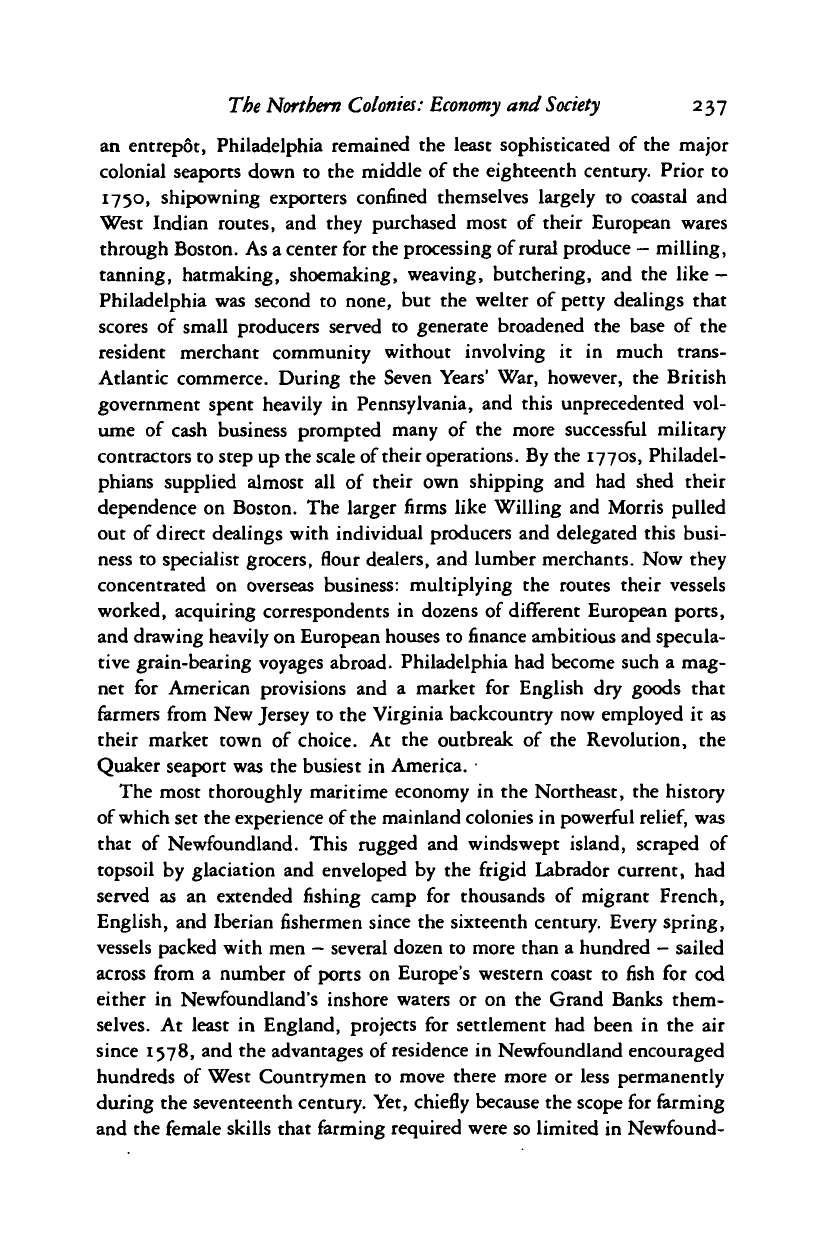
The Northern Colonies:
Economy
and
Society
237
an entrepot, Philadelphia remained the least sophisticated of the major
colonial seaports down to the middle of the eighteenth century. Prior to
1750,
shipowning exporters confined themselves largely to coastal and
West Indian routes, and they purchased most of their European wares
through Boston. As a center for the processing of rural produce - milling,
tanning, hatmaking, shoemaking, weaving, butchering, and the like
—
Philadelphia was second to none, but the welter of petty dealings that
scores of small producers served to generate broadened the base of the
resident merchant community without involving it in much trans-
Atlantic commerce. During the Seven Years' War, however, the British
government spent heavily in Pennsylvania, and this unprecedented vol-
ume of cash business prompted many of the more successful military
contractors to step up the scale of their operations. By the 1770s, Philadel-
phians supplied almost all of their own shipping and had shed their
dependence on Boston. The larger firms like Willing and Morris pulled
out of direct dealings with individual producers and delegated this busi-
ness to specialist grocers, flour dealers, and lumber merchants. Now they
concentrated on overseas business: multiplying the routes their vessels
worked, acquiring correspondents in dozens of different European ports,
and drawing heavily on European houses to finance ambitious and specula-
tive grain-bearing voyages abroad. Philadelphia had become such a mag-
net for American provisions and a market for English dry goods that
farmers from New Jersey to the Virginia backcountry now employed it as
their market town of choice. At the outbreak of the Revolution, the
Quaker seaport was the busiest in America.
The most thoroughly maritime economy in the Northeast, the history
of which set the experience of the mainland colonies in powerful
relief,
was
that of Newfoundland. This rugged and windswept island, scraped of
topsoil by glaciation and enveloped by the frigid Labrador current, had
served as an extended fishing camp for thousands of migrant French,
English, and Iberian fishermen since the sixteenth century. Every spring,
vessels packed with men - several dozen to more than a hundred - sailed
across from a number of ports on Europe's western coast to fish for cod
either in Newfoundland's inshore waters or on the Grand Banks them-
selves. At least in England, projects for settlement had been in the air
since 1578, and the advantages of residence in Newfoundland encouraged
hundreds of West Countrymen to move there more or less permanently
during the seventeenth century. Yet, chiefly because the scope for farming
and the female skills that farming required were so limited in Newfound-
Cambridge Histories Online © Cambridge University Press, 2008
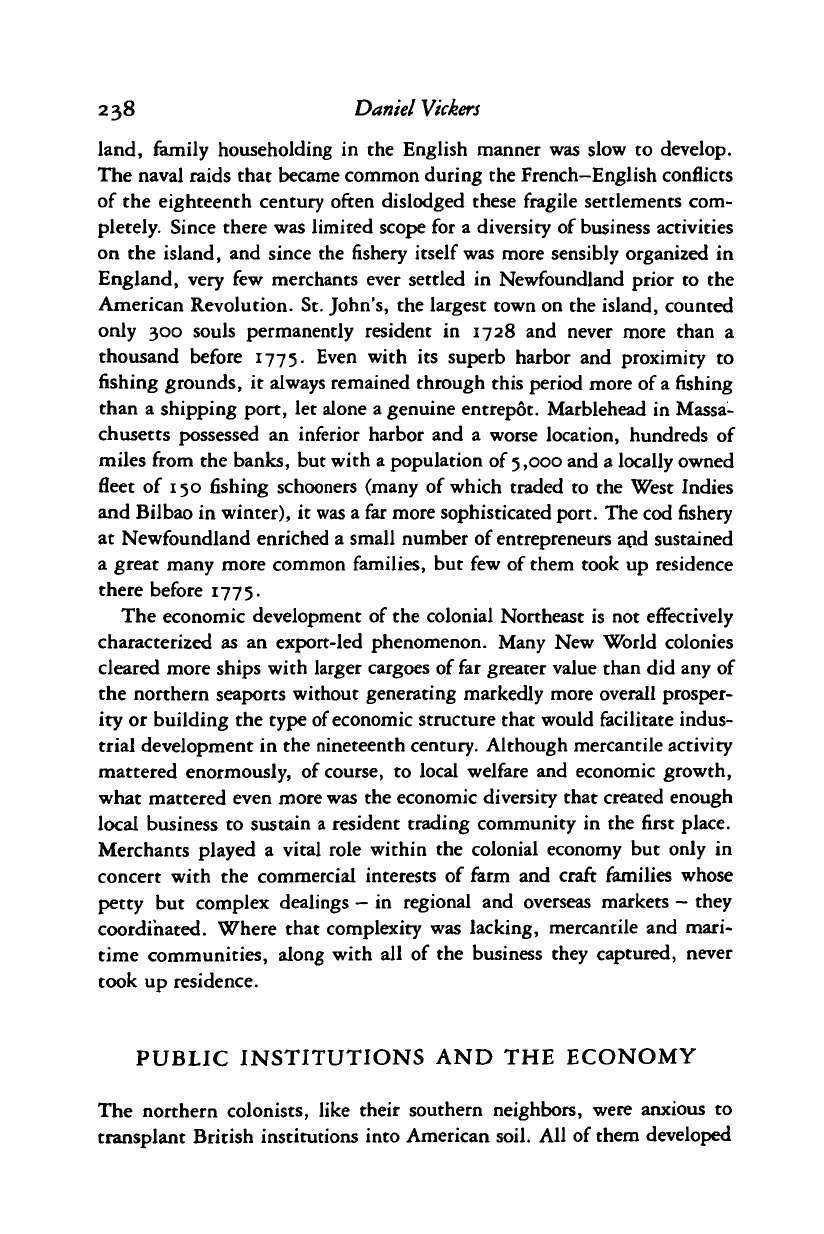
238 DanielVickers
land, family householding in the English manner was slow to develop.
The naval raids that became common during the French—English conflicts
of the eighteenth century often dislodged these fragile settlements com-
pletely. Since there was limited scope for a diversity of business activities
on the island, and since the fishery itself was more sensibly organized in
England, very few merchants ever settled in Newfoundland prior to the
American Revolution. St. John's, the largest town on the island, counted
only 300 souls permanently resident in 1728 and never more than a
thousand before 1775. Even with its superb harbor and proximity to
fishing grounds, it always remained through this period more of
a
fishing
than a shipping port, let alone a genuine entrepot. Marblehead in Massa-
chusetts possessed an inferior harbor and a worse location, hundreds of
miles from the banks, but with a population of
5,000
and a locally owned
fleet of 150 fishing schooners (many of which traded to the West Indies
and Bilbao in winter), it was a far more sophisticated port. The cod fishery
at Newfoundland enriched a small number of entrepreneurs and sustained
a great many more common families, but few of them took up residence
there before 1775.
The economic development of the colonial Northeast is not effectively
characterized as an export-led phenomenon. Many New World colonies
cleared more ships with larger cargoes of far greater value than did any of
the northern seaports without generating markedly more overall prosper-
ity or building the type of economic structure that would facilitate indus-
trial development in the nineteenth century. Although mercantile activity
mattered enormously, of course, to local welfare and economic growth,
what mattered even more
was
the economic diversity that created enough
local business to sustain a resident trading community in the first place.
Merchants played a vital role within the colonial economy but only in
concert with the commercial interests of farm and craft families whose
petty but complex dealings
—
in regional and overseas markets - they
coordinated. Where that complexity was lacking, mercantile and mari-
time communities, along with all of the business they captured, never
took up residence.
PUBLIC INSTITUTIONS AND THE ECONOMY
The northern colonists, like their southern neighbors, were anxious to
transplant British institutions into American soil. All of them developed
Cambridge Histories Online © Cambridge University Press, 2008
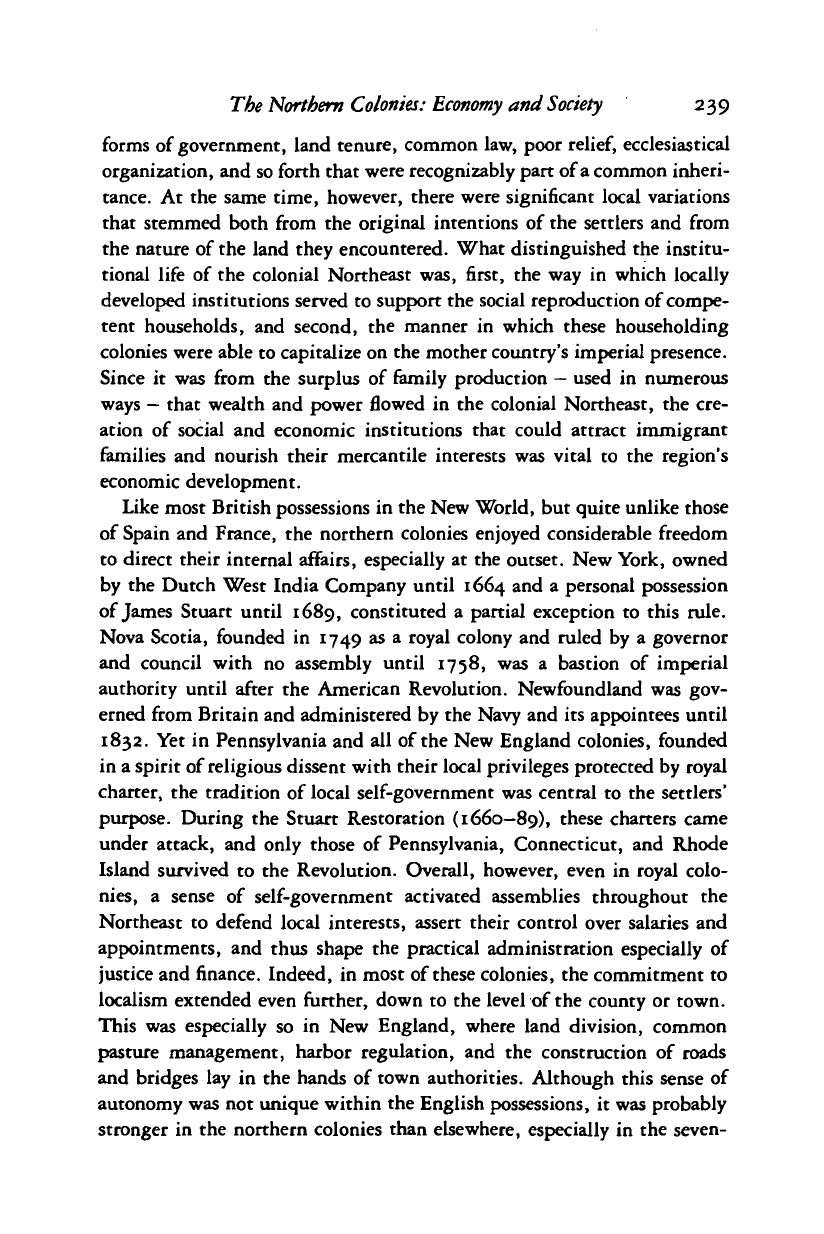
The
Northern
Colonies:
Economy
and
Society
239
forms of government, land tenure, common law, poor
relief,
ecclesiastical
organization, and so forth that were recognizably part of a common inheri-
tance. At the same time, however, there were significant local variations
that stemmed both from the original intentions of the settlers and from
the nature of the land they encountered. What distinguished the institu-
tional life of the colonial Northeast was, first, the way in which locally
developed institutions served to support the social reproduction of compe-
tent households, and second, the manner in which these householding
colonies were able to capitalize on the mother country's imperial presence.
Since it was from the surplus of family production
—
used in numerous
ways
—
that wealth and power flowed in the colonial Northeast, the cre-
ation of social and economic institutions that could attract immigrant
families and nourish their mercantile interests was vital to the region's
economic development.
Like most British possessions in the New World, but quite unlike those
of Spain and France, the northern colonies enjoyed considerable freedom
to direct their internal affairs, especially at the outset. New York, owned
by the Dutch West India Company until 1664 and a personal possession
of
James
Stuart until 1689, constituted a partial exception to this rule.
Nova Scotia, founded in 1749 as a royal colony and ruled by a governor
and council with no assembly until 1758, was a bastion of imperial
authority until after the American Revolution. Newfoundland was gov-
erned from Britain and administered by the Navy and its appointees until
1832.
Yet in Pennsylvania and all of the New England colonies, founded
in a spirit of religious dissent with their local privileges protected by royal
charter, the tradition of local self-government was central to the settlers'
purpose. During the Stuart Restoration (1660-89), these charters came
under attack, and only those of Pennsylvania, Connecticut, and Rhode
Island survived to the Revolution. Overall, however, even in royal colo-
nies,
a sense of self-government activated assemblies throughout the
Northeast to defend local interests, assert their control over salaries and
appointments, and thus shape the practical administration especially of
justice and finance. Indeed, in most of these colonies, the commitment to
localism extended even further, down to the level of the county or town.
This was especially so in New England, where land division, common
pasture management, harbor regulation, and the construction of roads
and bridges lay in the hands of town authorities. Although this sense of
autonomy was not unique within the English possessions, it was probably
stronger in the northern colonies than elsewhere, especially in the seven-
Cambridge Histories Online © Cambridge University Press, 2008

240 Daniel
Vickers
teenth century, and it was part of what attracted family units there from
the beginning.
The attachment to local control in political matters was part of a broader
enthusiasm for local institutions in general. Most churches in both New
England and the Middle Colonies were founded in dissent and were quite
independent of metropolitan influences. Colleges primarily for the training
of ministers began in 1636 with the founding of Harvard in Massachusetts;
by the end of the colonial period, there were nearly
a
dozen similar institu-
tions north of the Chesapeake. Primary schools were particularly wide-
spread in New England, but northern communities in general were better
provided with educational facilities than were their southern counterparts.
The Bay Colony possessed printing facilities within
a
decade of settlement;
in Pennsylvania, the same
was
achieved in less than five
years;
and by 1700,
there
were presses
in New York, too. By comparison, there
were no
printing
houses in the southern colonies before 1726. Public marketplaces made
swift appearances in Boston (1634), New York (1648), and Philadelphia
(1685),
and each one of them possessed a substantial covered building by
the early eighteenth century. The jails, almshouses, sewers, wharfs, and
bridges that were soon common to all of these towns indicate still further
the institutional depth that most northern colonies managed to achieve in
the first century of their
existence.
Compared to the influence of the Jesuits
in Portuguese Brazil or that of the Spanish mint in Peru, the direct eco-
nomic impact of these institutions was minimal. Furthermore,
as the
exam-
ple of the British plantation colonies illustrates, a panoply of institutions
was not an essential element of regional prosperity. Yet churches, schools,
and marketplaces did matter in one fundamental
way:
as a necessary part of
the process by which households might expect to reproduce themselves,
they reinforced the pattern of family immigration.
Although provincial and town governments were obviously concerned
about the course of local development, there is some debate over the
character of their intervention. Were the institutional structures that the
colonists imported from England and then reshaped to fit local preferences
vehicles of capitalist development or mechanisms of social control? In
effect, they served both purposes, but in intention, they were aimed at
something different. Although local and colonial authorities in the North-
east were deeply interested in husbanding the local economy, they under-
stood their goal as not to maximize the productivity of capital and labor
but rather to advance the welfare of individual households. When it was
felt that families could protect and advance their interests independently
Cambridge Histories Online © Cambridge University Press, 2008
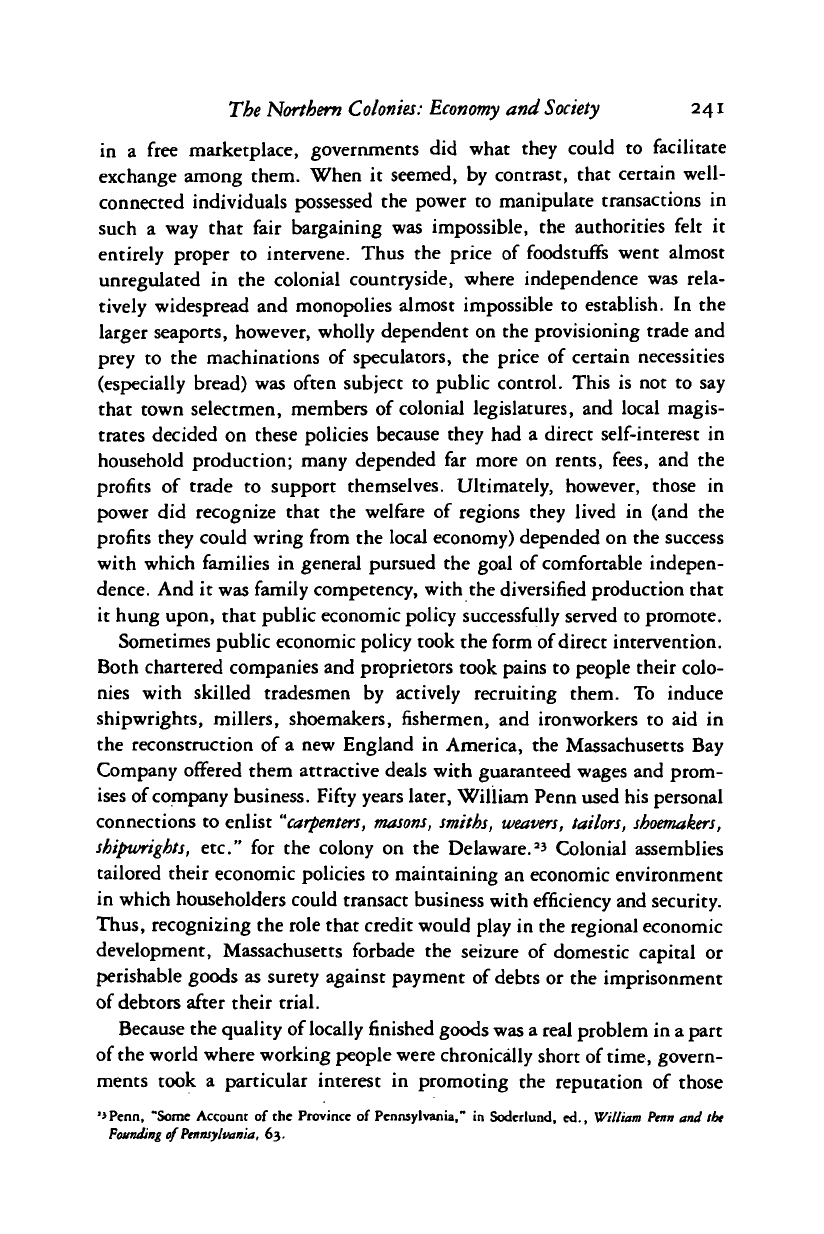
The Northern Colonies:
Economy
and
Society
241
in a free marketplace, governments did what they could to facilitate
exchange among them. When it seemed, by contrast, that certain well-
connected individuals possessed the power to manipulate transactions in
such a way that fair bargaining was impossible, the authorities felt it
entirely proper to intervene. Thus the price of foodstuffs went almost
unregulated in the colonial countryside, where independence was rela-
tively widespread and monopolies almost impossible to establish. In the
larger seaports, however, wholly dependent on the provisioning trade and
prey to the machinations of speculators, the price of certain necessities
(especially bread) was often subject to public control. This is not to say
that town selectmen, members of colonial legislatures, and local magis-
trates decided on these policies because they had a direct self-interest in
household production; many depended far more on rents, fees, and the
profits of trade to support themselves. Ultimately, however, those in
power did recognize that the welfare of regions they lived in (and the
profits they could wring from the local economy) depended on the success
with which families in general pursued the goal of comfortable indepen-
dence. And it was family competency, with the diversified production that
it hung upon, that public economic policy successfully served to promote.
Sometimes public economic policy took the form of direct intervention.
Both chartered companies and proprietors took pains to people their colo-
nies with skilled tradesmen by actively recruiting them. To induce
shipwrights, millers, shoemakers, fishermen, and ironworkers to aid in
the reconstruction of a new England in America, the Massachusetts Bay
Company offered them attractive deals with guaranteed wages and prom-
ises of company business. Fifty years later, William Penn used his personal
connections to enlist "carpenters, masons, smiths, weavers, tailors, shoemakers,
shipwrights, etc." for the colony on the Delaware.^ Colonial assemblies
tailored their economic policies to maintaining an economic environment
in which householders could transact business with efficiency and security.
Thus,
recognizing the role that credit would play in the regional economic
development, Massachusetts forbade the seizure of domestic capital or
perishable goods as surety against payment of debts or the imprisonment
of debtors after their trial.
Because the quality of locally finished goods was a real problem in a part
of the world where working people were chronically short of
time,
govern-
ments took a particular interest in promoting the reputation of those
'iPenn, "Some Account of the Province of Pennsylvania," in Soderlund, ed., William
Penn
and the
Founding
of Pennsylvania, 63.
Cambridge Histories Online © Cambridge University Press, 2008

242 Daniel
Vickers
goods abroad. New York - in an act of direct intervention
—
began the
compulsory inspection of exported flour in 1665, and Pennsylvania
adopted similar regulations in 1722. The General Court in Massachusetts
took note of the "damage ... to merchants trading hence by bade mak-
ing offish, and the . . . prejudice of our commerce with other nations,"
and ordered the institution offish cullers to grade the product in 1632. In
an effort to regularize business, all of
the
assemblies concerned themselves
with enforcing standardized weights and measures, appointing specific
market days, licensing ferries, and so forth. Local governments occasion-
ally played the same role on a smaller stage. Towns needing millers and
smiths or wishing to establish specialized local industries were quite
prepared to offer land and other privileges to prospective settlers with the
right skills. It was with an understanding of the difficulties in adapting
the household economy to frontier conditions, and the opportunities to
draw profit from householding operations, that local and provincial au-
thorities were ready to employ government's hand.
Still, the greatest service that public institutions provided to household-
ers was simply assuring them the means of acquiring propertied indepen-
dence, and nothing mattered more in this sphere than the security of land
tenure. Property rights varied from region to region throughout the North-
east, but insofar as land everywhere was held almost entirely under free
and common socage
—
that is, with full rights to exploit surface and
subsurface resources, as well as to sell or lease them and pass them along in
inheritance
—
landowners had considerable latitude to employ their prop-
erty as they saw fit. Some limitations did exist in certain colonies. Land-
holders in Pennsylvania were expected to pay quitrents to the Penn family,
from whom they had purchased farms, and manorial tenants in New York
occupied their lands on terms that carried certain feudal overtones (includ-
ing light labor services) to the end of the colonial period. In no portion of
British America, however, did customary limitations on tenure seriously
hamper the development of a commercial market in land. Even on manors
in the Hudson Valley, where freehold was unknown, leased farms changed
hands in practice with a minimum of
fuss.
The only important charges on
land throughout the colonies were taxes - low enough not to burden
improved property, but high enough to encourage the owners of undevel-
oped land to arrange for its development by working farmers as quickly as
possible. Free and common socage provided, therefore, not only the lib-
erty to carve up and employ land in the most profitable manner, but also a
penalty through rising taxes on those who did not. So, although it did not
Cambridge Histories Online © Cambridge University Press, 2008
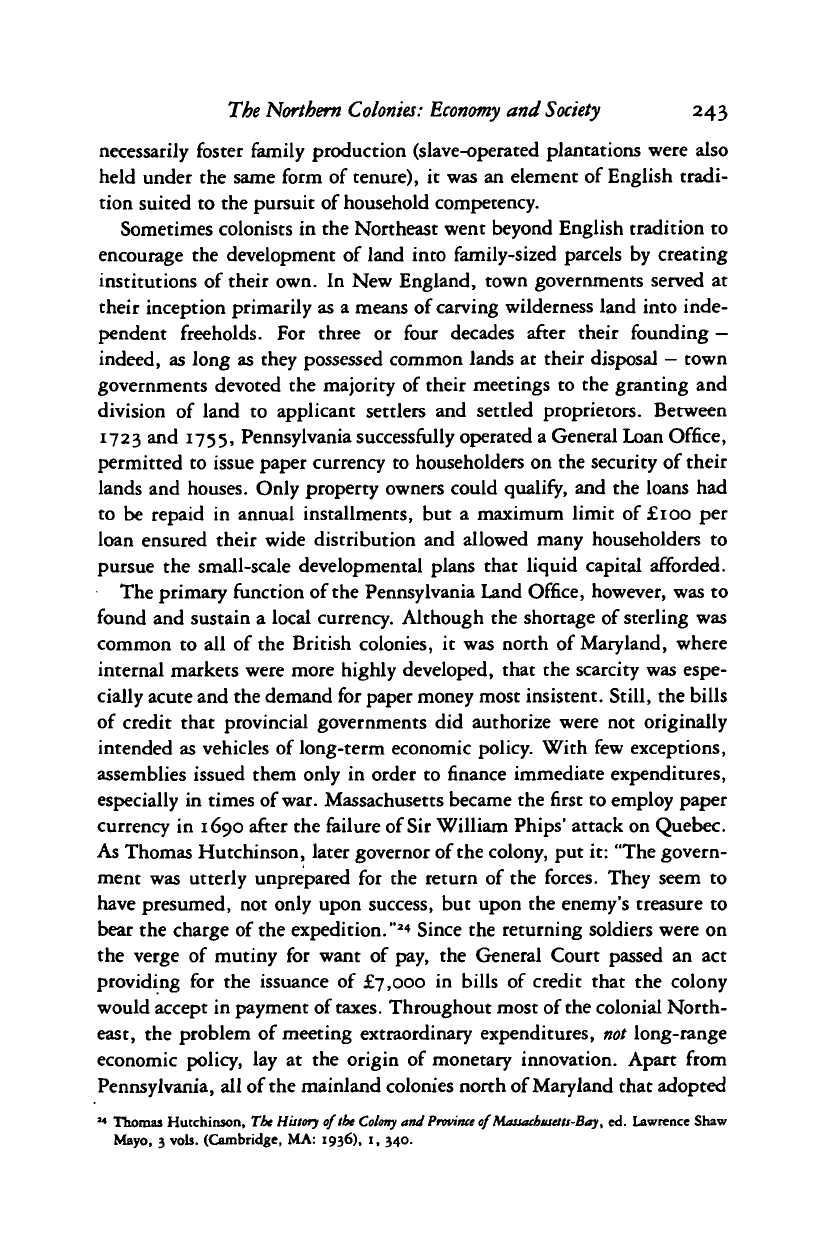
The Northern Colonies:
Economy
and
Society
243
necessarily foster family production (slave-operated plantations were also
held under the same form of tenure), it was an element of English tradi-
tion suited to the pursuit of household competency.
Sometimes colonists in the Northeast went beyond English tradition to
encourage the development of land into family-sized parcels by creating
institutions of their own. In New England, town governments served at
their inception primarily as a means of carving wilderness land into inde-
pendent freeholds. For three or four decades after their founding
—
indeed, as long as they possessed common lands at their disposal
—
town
governments devoted the majority of their meetings to the granting and
division of land to applicant settlers and settled proprietors. Between
1723 and 1755, Pennsylvania successfully operated a General Loan Office,
permitted to issue paper currency to householders on the security of their
lands and houses. Only property owners could qualify, and the loans had
to be repaid in annual installments, but a maximum limit of £100 per
loan ensured their wide distribution and allowed many householders to
pursue the small-scale developmental plans that liquid capital afforded.
The primary function of
the
Pennsylvania Land Office, however, was to
found and sustain a local currency. Although the shortage of sterling was
common to all of the British colonies, it was north of Maryland, where
internal markets were more highly developed, that the scarcity was espe-
cially acute and the demand for paper money most insistent. Still, the bills
of credit that provincial governments did authorize were not originally
intended as vehicles of long-term economic policy. With few exceptions,
assemblies issued them only in order to finance immediate expenditures,
especially in times of war. Massachusetts became the first to employ paper
currency in 1690 after the failure of Sir William Phips' attack on Quebec.
As Thomas Hutchinson, later governor of the colony, put it: "The govern-
ment was utterly unprepared for the return of the forces. They seem to
have presumed, not only upon success, but upon the enemy's treasure to
bear the charge of the expedition."
2
* Since the returning soldiers were on
the verge of mutiny for want of pay, the General Court passed an act
providing for the issuance of £7,000 in bills of credit that the colony
would accept in payment of
taxes.
Throughout most of
the
colonial North-
east, the problem of meeting extraordinary expenditures,
not
long-range
economic policy, lay at the origin of monetary innovation. Apart from
Pennsylvania, all of the mainland colonies north of Maryland that adopted
*< Thomas Hutchinson, The History oflht
Colony
and
Province
of Massachiuetti-Bay, ed. Lawrence Shaw
Mayo, 3 vols. (Cambridge, MA: 1936), 1, 340.
Cambridge Histories Online © Cambridge University Press, 2008
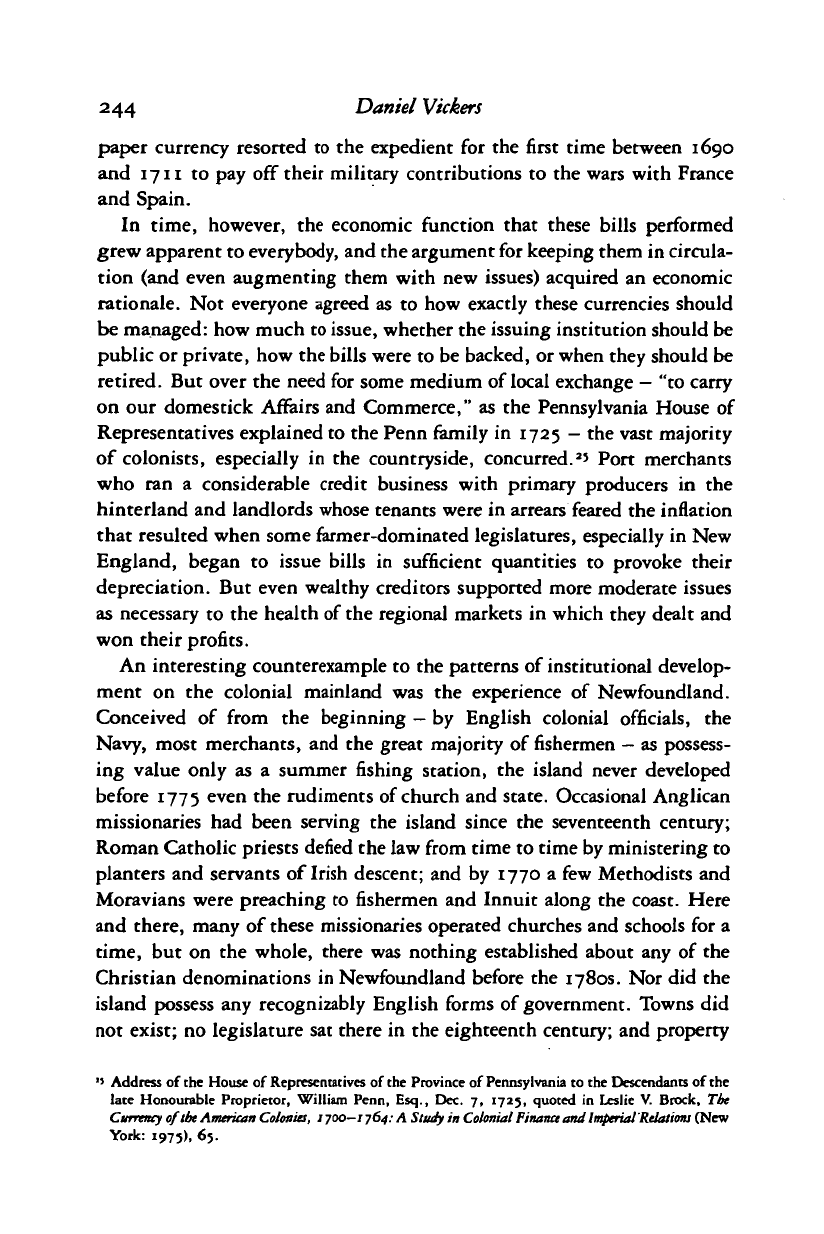
244 Daniel
Vickers
paper currency resorted to the expedient for the first time between 1690
and 1711 to pay off their military contributions to the wars with France
and Spain.
In time, however, the economic function that these bills performed
grew apparent to everybody, and the argument for keeping them in circula-
tion (and even augmenting them with new issues) acquired an economic
rationale. Not everyone agreed as to how exactly these currencies should
be managed: how much to issue, whether the issuing institution should be
public or private, how the bills were to be backed, or when they should be
retired. But over the need for some medium of
local
exchange - "to carry
on our domestick Affairs and Commerce," as the Pennsylvania House of
Representatives explained to the Penn family in 1725
—
the vast majority
of colonists, especially in the countryside, concurred.
2
' Port merchants
who ran a considerable credit business with primary producers in the
hinterland and landlords whose tenants were in arrears feared the inflation
that resulted when some farmer-dominated legislatures, especially in New
England, began to issue bills in sufficient quantities to provoke their
depreciation. But even wealthy creditors supported more moderate issues
as necessary to the health of the regional markets in which they dealt and
won their profits.
An interesting counterexample to the patterns of institutional develop-
ment on the colonial mainland was the experience of Newfoundland.
Conceived of from the beginning - by English colonial officials, the
Navy, most merchants, and the great majority of
fishermen
—
as possess-
ing value only as a summer fishing station, the island never developed
before 1775 even the rudiments of church and state. Occasional Anglican
missionaries had been serving the island since the seventeenth century;
Roman Catholic priests defied the law from time to time by ministering to
planters and servants of Irish descent; and by 1770 a few Methodists and
Moravians were preaching to fishermen and Innuit along the coast. Here
and there, many of these missionaries operated churches and schools for a
time,
but on the whole, there was nothing established about any of the
Christian denominations in Newfoundland before the 1780s. Nor did the
island possess any recognizably English forms of government. Towns did
not exist; no legislature sat there in the eighteenth century; and property
" Address of the House of Representatives of the Province of Pennsylvania to the Descendants of the
late Honourable Proprietor, William Penn, Esq., Dec. 7, 172;, quoted in Leslie V. Brock, The
Currency
of
the
American
Colonies,
1700—7
764: A Study in Colonial
Finance
and
Imperial Relations
(New
York: 1975), 65.
Cambridge Histories Online © Cambridge University Press, 2008
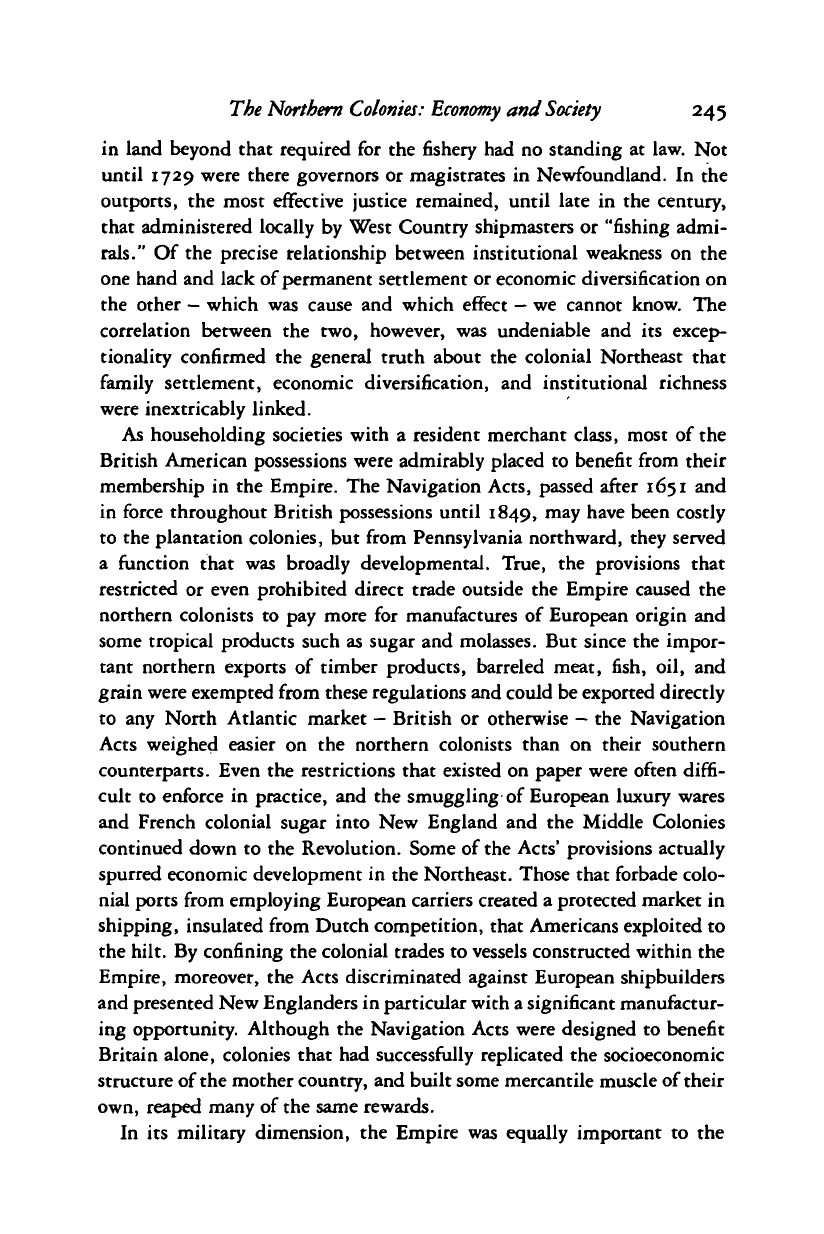
The Northern Colonies:
Economy
and
Society
245
in land beyond that required for the fishery had no standing at law. Not
until 1729 were there governors or magistrates in Newfoundland. In the
outports, the most effective justice remained, until late in the century,
that administered locally by West Country shipmasters or "fishing admi-
rals."
Of the precise relationship between institutional weakness on the
one hand and lack of permanent settlement or economic diversification on
the other - which was cause and which effect - we cannot know. The
correlation between the two, however, was undeniable and its excep-
tionality confirmed the general truth about the colonial Northeast that
family settlement, economic diversification, and institutional richness
were inextricably linked.
As householding societies with a resident merchant class, most of the
British American possessions were admirably placed to benefit from their
membership in the Empire. The Navigation Acts, passed after 1651 and
in force throughout British possessions until 1849, may have been costly
to the plantation colonies, but from Pennsylvania northward, they served
a function that was broadly developmental. True, the provisions that
restricted or even prohibited direct trade outside the Empire caused the
northern colonists to pay more for manufactures of European origin and
some tropical products such as sugar and molasses. But since the impor-
tant northern exports of timber products, barreled meat, fish, oil, and
grain were exempted from these regulations and could be exported directly
to any North Atlantic market
—
British or otherwise
—
the Navigation
Acts weighed easier on the northern colonists than on their southern
counterparts. Even the restrictions that existed on paper were often diffi-
cult to enforce in practice, and the smuggling-of European luxury wares
and French colonial sugar into New England and the Middle Colonies
continued down to the Revolution. Some of the Acts' provisions actually
spurred economic development in the Northeast. Those that forbade colo-
nial ports from employing European carriers created a protected market in
shipping, insulated from Dutch competition, that Americans exploited to
the hilt. By confining the colonial trades to vessels constructed within the
Empire, moreover, the Acts discriminated against European shipbuilders
and presented New Englanders in particular with
a
significant manufactur-
ing opportunity. Although the Navigation Acts were designed to benefit
Britain alone, colonies that had successfully replicated the socioeconomic
structure of the mother country, and built some mercantile muscle of their
own, reaped many of the same rewards.
In its military dimension, the Empire was equally important to the
Cambridge Histories Online © Cambridge University Press, 2008
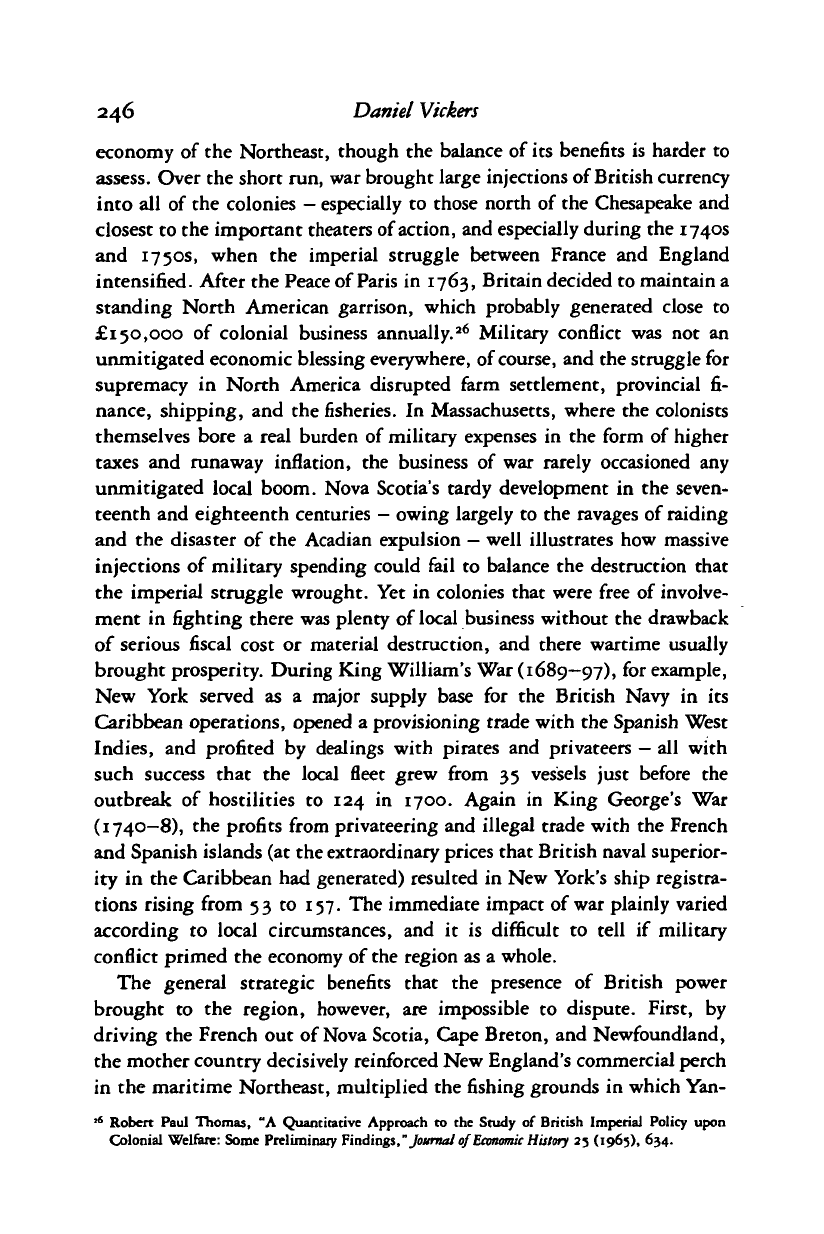
246 Daniel
Vickers
economy of the Northeast, though the balance of its benefits is harder to
assess. Over the short run, war brought large injections of British currency
into all of the colonies - especially to those north of the Chesapeake and
closest to the important theaters of action, and especially during the 1740s
and 1750s, when the imperial struggle between France and England
intensified. After the Peace of
Paris
in 1763, Britain decided to maintain a
standing North American garrison, which probably generated close to
£150,000 of colonial business annually.
26
Military conflict was not an
unmitigated economic blessing everywhere, of course, and the struggle for
supremacy in North America disrupted form settlement, provincial fi-
nance, shipping, and the fisheries. In Massachusetts, where the colonists
themselves bore a real burden of military expenses in the form of higher
taxes and runaway inflation, the business of war rarely occasioned any
unmitigated local boom. Nova Scotia's tardy development in the seven-
teenth and eighteenth centuries
—
owing largely to the ravages of raiding
and the disaster of the Acadian expulsion
—
well illustrates how massive
injections of military spending could foil to balance the destruction that
the imperial struggle wrought. Yet in colonies that were free of involve-
ment in fighting there was plenty of local business without the drawback
of serious fiscal cost or material destruction, and there wartime usually
brought prosperity. During King William's War (1689—97), for example,
New York served as a major supply base for the British Navy in its
Caribbean operations, opened a provisioning trade with the Spanish West
Indies, and profited by dealings with pirates and privateers
—
all with
such success that the local fleet grew from 35 vessels just before the
outbreak of hostilities to 124 in 1700. Again in King George's War
(1740-8), the profits from privateering and illegal trade with the French
and Spanish islands (at the extraordinary prices that British naval superior-
ity in the Caribbean had generated) resulted in New York's ship registra-
tions rising from 53 to 157. The immediate impact of war plainly varied
according to local circumstances, and it is difficult to tell if military
conflict primed the economy of the region as a whole.
The general strategic benefits that the presence of British power
brought to the region, however, are impossible to dispute. First, by
driving the French out of Nova Scotia, Cape Breton, and Newfoundland,
the mother country decisively reinforced New England's commercial perch
in the maritime Northeast, multiplied the fishing grounds in which Yan-
16
Robert Paul Thomas, "A Quantitative Approach to the Study of British Imperial Policy upon
Colonial Welfare: Some Preliminary Findings," Journal
ofEconomic
History 23 (196)), 634.
Cambridge Histories Online © Cambridge University Press, 2008
